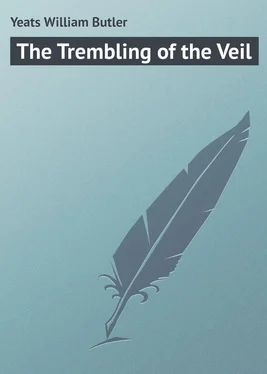William Yeats - The Trembling of the Veil
Здесь есть возможность читать онлайн «William Yeats - The Trembling of the Veil» — ознакомительный отрывок электронной книги совершенно бесплатно, а после прочтения отрывка купить полную версию. В некоторых случаях можно слушать аудио, скачать через торрент в формате fb2 и присутствует краткое содержание. Жанр: foreign_prose, на английском языке. Описание произведения, (предисловие) а так же отзывы посетителей доступны на портале библиотеки ЛибКат.
- Название:The Trembling of the Veil
- Автор:
- Жанр:
- Год:неизвестен
- ISBN:нет данных
- Рейтинг книги:5 / 5. Голосов: 1
-
Избранное:Добавить в избранное
- Отзывы:
-
Ваша оценка:
- 100
- 1
- 2
- 3
- 4
- 5
The Trembling of the Veil: краткое содержание, описание и аннотация
Предлагаем к чтению аннотацию, описание, краткое содержание или предисловие (зависит от того, что написал сам автор книги «The Trembling of the Veil»). Если вы не нашли необходимую информацию о книге — напишите в комментариях, мы постараемся отыскать её.
The Trembling of the Veil — читать онлайн ознакомительный отрывок
Ниже представлен текст книги, разбитый по страницам. Система сохранения места последней прочитанной страницы, позволяет с удобством читать онлайн бесплатно книгу «The Trembling of the Veil», без необходимости каждый раз заново искать на чём Вы остановились. Поставьте закладку, и сможете в любой момент перейти на страницу, на которой закончили чтение.
Интервал:
Закладка:
IV
Bedford Park had a red brick clubhouse with a little theatre that began to stir my imagination. I persuaded Todhunter to write a pastoral play and have it performed there.
A couple of years before, while we were still in Dublin, he had given at Hengler’s Circus, remodelled as a Greek Theatre, a most expensive performance of his Helena of Troas , an oratorical Swinburnian play which I had thought as unactable as it was unreadable. Since I was seventeen I had constantly tested my own ambition with Keats’s praise of him who “left great verses to a little clan,” so it was but natural that I should spend an evening persuading him that we had nothing to do with the great public, that it should be a point of honour to be content with our own little public, that he should write of shepherds and shepherdesses because people would expect them to talk poetry and move without melodrama. He wrote his Sicilian Idyll , which I have not looked at for thirty years, and never rated very high as poetry, and had the one unmistakable success of his life. The little theatre was full for twice the number of performances intended, for artists, men of letters and students had come from all over London.
I made through these performances a close friend and a discovery that was to influence my life. Todhunter had engaged several professional actors with a little reputation, but had given the chief woman’s part to Florence Farr, who had qualities no contemporary professional practice could have increased, the chief man’s part to an amateur, Heron Allen, solicitor, fiddler and popular writer on palmistry. Heron Allen and Florence Farr read poetry for their pleasure. While they were upon the stage no one else could hold an eye or an ear. Their speech was music, the poetry acquired a nobility, a passionate austerity that made it seem akin for certain moments to the great poetry of the world. Heron Allen, who had never spoken in public before except to lecture upon the violin, had the wisdom to reduce his acting to a series of poses, to be the stately shepherd with not more gesture than was needed to “twitch his mantle blue” and to let his grace be foil to Florence Farr’s more impassioned delivery. When they closed their mouths, and some other player opened his, breaking up the verse to make it conversational, jerking his body or his arms that he might seem no austere poetical image but very man, I listened in raging hatred. I kept my seat with difficulty, I searched my memory for insulting phrases, I even muttered them to myself that the people about might hear. I had discovered for the first time that in the performance of all drama that depends for its effect upon beauty of language, poetical culture may be more important than professional experience.
Florence Farr lived in lodgings some twenty minutes’ walk away at Brook Green, and I was soon a constant caller, talking over plays that I would some day write her. She had three great gifts, a tranquil beauty like that of Demeter’s image near the British Museum reading room door, and an incomparable sense of rhythm and a beautiful voice, the seeming natural expression of the image. And yet there was scarce another gift that she did not value above those three. We all have our simplifying image, our genius, and such hard burden does it lay upon us that, but for the praise of others, we would deride it and hunt it away. She could only express hers through an unfashionable art, an art that has scarce existed since the seventeenth century, and so could only earn unimportant occasional praise. She would dress without care or calculation as if to hide her beauty and seem contemptuous of its power. If a man fell in love with her she would notice that she had seen just that movement upon the stage or had heard just that intonation and all seemed unreal. If she read out some poem in English or in French all was passion, all a traditional splendour, but she spoke of actual things with a cold wit or under the strain of paradox. Wit and paradox alike sought to pull down whatever had tradition or passion and she was soon to spend her days in the British Museum reading room and become erudite in many heterogeneous studies moved by an insatiable, destroying curiosity. I formed with her an enduring friendship that was an enduring exasperation – “why do you play the part with a bent back and a squeak in the voice? How can you be a character actor, you who hate all our life, you who belong to a life that is a vision?” But argument was no use, and some Nurse in Euripedes must be played with all an old woman’s infirmities and not as I would have it, with all a Sybil’s majesty, because “it is no use doing what nobody wants,” or because she would show that she “could do what the others did.”
Читать дальшеИнтервал:
Закладка:
Похожие книги на «The Trembling of the Veil»
Представляем Вашему вниманию похожие книги на «The Trembling of the Veil» списком для выбора. Мы отобрали схожую по названию и смыслу литературу в надежде предоставить читателям больше вариантов отыскать новые, интересные, ещё непрочитанные произведения.
Обсуждение, отзывы о книге «The Trembling of the Veil» и просто собственные мнения читателей. Оставьте ваши комментарии, напишите, что Вы думаете о произведении, его смысле или главных героях. Укажите что конкретно понравилось, а что нет, и почему Вы так считаете.












